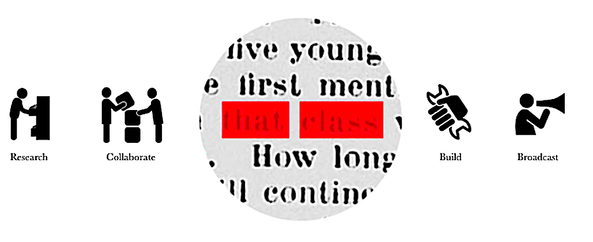THATClass empowers students and teachers to engage the past directly through archival immersion and fieldwork using a mix of methods and tools to UNcover stories untold and develop skills for life.
As featured in: |
Testimonials
"An unusual summer camp...full of interesting discoveries, perhaps the most important one being: You don’t have to be in grad school to fall in love with original source documents." John Kelly, The Washington Post
"Patrick and Tom...bonded over a shared belief that students learn best when they can immerse themselves in material. Textbooks can do only so much. Better to enter an archive, sift through documents and photographs, fire up a microfilm reader." John Kelly, The Washington Post
"I have never seen two educators working with students they had never met get them from topic, to finding aids, and into the records so quickly. It was truly an honor to be a part of what you are doing." Joel Walker, Director of Education, National Archives @ Atlanta
"Their answer has been to focus on encouraging students to pose their own questions of primary source materials. Over the past decade, large-scale digitization and access to archival materials via the web has led many educators to use primary sources in classrooms at all levels. Less common is the expectation that students engage in question-driven discovery themselves." Seth Denbo, for the American Historical Association's Perspectives on History
"When Maurice Jackson, professor of history and African American studies at Georgetown University, looked at the materials the students created, he was impressed by their precocious skills...THATClass encouraged the students to 'know how to read history and archive and document it....These students “took the archives by the horn,” he said, and found things that “even the trained [historian] might not find.” Seth Denbo, for the American Historical Association's Perspectives on History
"Just everyday people that are interested in the 1968 riots are going to read my words. I think that's pretty cool." Aaron, THATSummer Participant
"I think that what we've mostly done that hasn't been done before...is give a context to the 1968 riots because I don't think it's really been talked about how the conditions for the black community were before the riots." Brian, THATSummer Participant
"It wasn't 'fun fun,' he said, 'but I wanted to keep researching and I wanted to keep going. It was interesting and I wanted to keep pursuing what I was doing. After it was over, looking back, I wished we’d had more time.'” from Washington Post reporter, John Kelly's discussion withTHATSummer participant, Brian.
"Because the knowledge has been brought to life it should be easier for people to understand it." Caleb, THATSummer Participant
"What do you mean by 'brought to life?'" THATClass
"So the resources were there...it's just like cooking. You need to get the whole meal...we had the vegetables and everything, they were there, in the archives and all the other places we visited but we brought them together and made a meal out of it..." Caleb
"Did it taste good?" THATClass
"Oh yeah, it tasted great." Caleb
"Patrick and Tom...bonded over a shared belief that students learn best when they can immerse themselves in material. Textbooks can do only so much. Better to enter an archive, sift through documents and photographs, fire up a microfilm reader." John Kelly, The Washington Post
"I have never seen two educators working with students they had never met get them from topic, to finding aids, and into the records so quickly. It was truly an honor to be a part of what you are doing." Joel Walker, Director of Education, National Archives @ Atlanta
"Their answer has been to focus on encouraging students to pose their own questions of primary source materials. Over the past decade, large-scale digitization and access to archival materials via the web has led many educators to use primary sources in classrooms at all levels. Less common is the expectation that students engage in question-driven discovery themselves." Seth Denbo, for the American Historical Association's Perspectives on History
"When Maurice Jackson, professor of history and African American studies at Georgetown University, looked at the materials the students created, he was impressed by their precocious skills...THATClass encouraged the students to 'know how to read history and archive and document it....These students “took the archives by the horn,” he said, and found things that “even the trained [historian] might not find.” Seth Denbo, for the American Historical Association's Perspectives on History
"Just everyday people that are interested in the 1968 riots are going to read my words. I think that's pretty cool." Aaron, THATSummer Participant
"I think that what we've mostly done that hasn't been done before...is give a context to the 1968 riots because I don't think it's really been talked about how the conditions for the black community were before the riots." Brian, THATSummer Participant
"It wasn't 'fun fun,' he said, 'but I wanted to keep researching and I wanted to keep going. It was interesting and I wanted to keep pursuing what I was doing. After it was over, looking back, I wished we’d had more time.'” from Washington Post reporter, John Kelly's discussion withTHATSummer participant, Brian.
"Because the knowledge has been brought to life it should be easier for people to understand it." Caleb, THATSummer Participant
"What do you mean by 'brought to life?'" THATClass
"So the resources were there...it's just like cooking. You need to get the whole meal...we had the vegetables and everything, they were there, in the archives and all the other places we visited but we brought them together and made a meal out of it..." Caleb
"Did it taste good?" THATClass
"Oh yeah, it tasted great." Caleb






